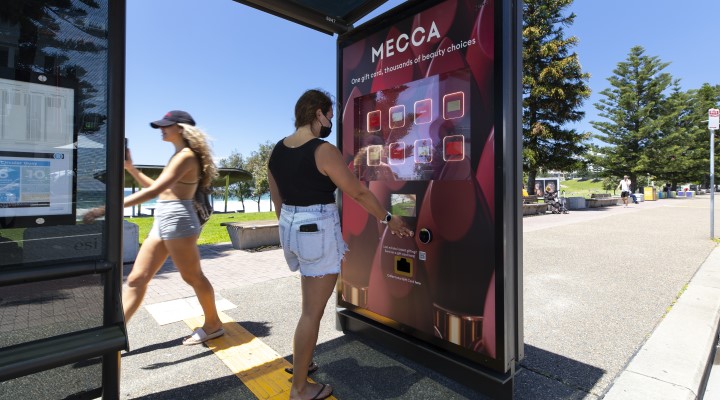Beauty retailer Mecca is creating new opportunities to connect with Christmas shoppers by introducing gift card vending machines in high foot traffic areas of Australia’s major cities. The retailer’s ‘gifting’ panels, located at Bondi Beach in Sydney, Federation Square in Melbourne and in Brisbane’s Queen Street Mall are positioned to serve consumers with a speedy and convenient shopping experience while they are out and about in the lead up to Christmas. Created in partner
artnership with media company JCDecaux and agency OMD, it’s Australia’s first pay-to-dispense out-of-home (OOH) campaign and is expected to boost the retailer’s holiday campaign, The Beauty Spectacular, which centres around “bringing beauty to every moment”.
“This holiday campaign, we aimed to bring the Mecca magic to life for new and existing customers outside our stores and are thrilled to deliver these innovative OOH media and interactive digital experiences … that make the customer journey seamless and fun for shoppers searching for the perfect gift,” said Kate Blythe, Mecca’s chief marketing officer.
“Extending Mecca’s unbeatable in-store experience into the outside world in unexpected, accessible, and industry-leading ways will be an ongoing part of Mecca’s strategy as we move into 2022.”
The technology combines PayWave and credit card payment with dispensing capabilities for gift cards between $25 – $100.
Penny Shell, head of product at OMD, said OOH was selected for its ability to drive attention while people are on the move.
“Large format and street furniture are perfect to showcase Mecca’s stunning creative with reach and scale, while the special build ‘gifting’ panels take the Mecca experience beyond the store for a surprising, convenient and interactive shopping experience,” she said.
Challenging perceptions
The global market for vending machines estimated at US$134.4 billion in 2020, is projected to reach US$146.6 billion by 2027, growing at a CAGR of 1.3 per cent, according to a recent report by ResearchAndMarkets.com.
Retail strategist Norrelle Goldring said that while vending machines received less traffic during the pandemic, particularly at airports with no travel, contactless machines will become the norm, particularly for “use-now occasions and categories”. The big challenge will be introducing new categories and shifting consumers’ mindsets about what to expect at vending machines.
“Australia has traditionally had a beverage and snack traditional vending focus, with more than half of vending sales being cold beverages. Mecca and Tiffany’s vending machines are the exceptions here, rather than the rule,” she said. A few years ago, Tiffany’s installed a vending machine within its London store, where customers could buy the brand’s fragrance.
Goldring said consumers are becoming more planned and purposeful in their shopping trips and that this could impact the uptake.
“Vending machines are not going to be a fit for anything that’s a destination purchase, because of the serendipity of their location being near where a consumer is at that particular moment,” she said.
Global uptake
Japan, the home of vending machines, has over 4 million vending machines, the most per capita of any country in the world. And they proved to be a valuable revenue stream for many companies during the pandemic.
Goldring believes Japan’s strength in vending machines and convenience stores is driven by the city’s high pedestrian count.
“Very few people drive and everyone in big cities catches public transport, [going] on foot from home to train and train to office, with the vendors lining the stations,” Goldring said.
In the US, vending machines have more categories that are occasion and location specific, according to Goldring.
“In the US, you can get a fresh hot pizza vended in three minutes, and in places like Beverly Hills buy caviar, escargot, and bottarga from vending machines,” she said.
“In airports, there are Best Buy machines [selling] vending headphones for flights for instance, or Benefit machines [with] skincare such as moisturisers for in-flight touch-ups.”
The nature of self serve
However, Goldring believes vending machines could be impacted by the changing nature of the self-serve market and the rise of micro markets.
“Traditional vending machines are now competing with micro markets (the first of which opened in Australia in 2018) with players like Agora markets servicing office spaces,” she said.
“Even with fewer people working full time in offices, organisations need to provide more ‘lifestyle’ spaces for their employees to retain them will ensure micro markets grow.”
She also points to unmanned convenience stores and supermarkets such as Amazon Go in the US and Sweden’s LIFVS – a shipping-container supermarket servicing rural areas – as potential threats to vending machines.
“Whilst these are yet to make their mark in Australia, they will come,” she said.

